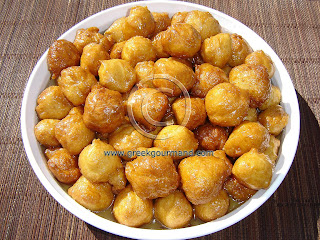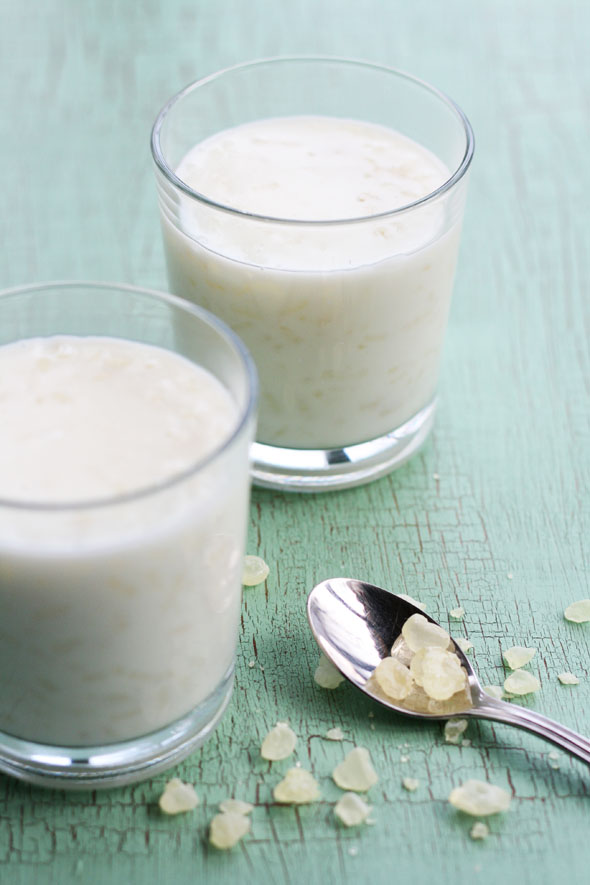Loukoumades, The Ancient Olympic Treat (Λουκουμάδες)

The official ancient Olympic doughnut - Click to Enlarge Image
The Olympic Hymn
Of the beautiful, the great and the true,
Descend, appear, and emblaze this place
With the glory of your own earth and sky.
Kindle the impulse in all noble contests,
Crown with the perennial wreath,
And fashion the steely and worthy body.
Like some great clear porphyrous shrine,
And every nation hurries here to your temple
In supplication, ancient immortal spirit.
Translation from Greek by: S. Sotiropoulos,
Two thousand seven hundred and eighty four years ago, in 776 B.C., the ancient Olympic Games were born. The very first Games were a simple affair consisting of only one event: a 200 metre footrace known as the ‘stadion’ from which we get the English word ‘stadium’. Over time, the Games developed to include many more events such as wrestling, jumping, discus and javelin throwing, chariot racing and boxing. When the Christian Byzantine Emperor Theodosius I abolished the ancient Games in 394 A.D., he not only put an end to a quadrennial pagan athletic festival, but he also put an end to a calendar system that reckoned its dates according to the succession of Olympiads since 776 B.C., a period of some 1170 years. Let us hope that the Modern Olympic Games will last as long.

Ancient Olympia, August '07 sporting my wild olive wreath - Click to Enlarge Image
The second point of confluence between the history of Greek cuisine and the Olympic Games was the traditional victory prize for athletes in the ancient Games. Victors were awarded a wreath or kotinos (κότινος in Gk.) fashioned from a small branch taken from a wild olive tree that stood in Zeus’ sacred grove at Olympia
The third and final point of convergence between the history of Greek food and the ancient Olympic Games was the ritual feeding of the victors at ancient Olympia Greece peninsula of Halkidiki, in the northern Greek region of Macedonia.
Ingredients:
1½ tablespoons active dry yeast
½ teaspoon salt
1 ½ - 2 cups lukewarm milk/water
1 cup of good quality Greek honey
Oil for deep frying (I used vegetable oil)
Cinnamon powder for dusting
1½ tablespoons active dry yeast
½ teaspoon salt
1 ½ - 2 cups lukewarm milk/water
1 cup of good quality Greek honey
Oil for deep frying (I used vegetable oil)
Cinnamon powder for dusting
- In a mixing bowl, dissolve the yeast in 1 cup lukewarm milk/water then cover the bowl with a cloth and let it stand for 10 minutes to allow the yeast to rise.
- Then gently add the flour and salt to the mixing bowl in stages and continue to mix well; sparingly add the remaining (and/or any additional) lukewarm milk/water while continually mixing. The resulting batter should end up as soft and sticky dough, soft enough to be able to drop from a spoon.
- Cover the mixing bowl with a cloth and place in a warm spot to rise for a couple hours, or until it has doubled in bulk and has bubbles forming on the surface.
- When the dough has risen, heat oil in a deep pan/fryer and prepare to fry the loukoumades in batches. You will need a teaspoon and a cup of cold water for this part. Dipping the teaspoon into the water before using it to spoon up portions of the dough will ensure that it does not stick to the spoon.
- Drop teaspoonfuls of the dough directly into the hot oil, helping with your fingertip if the dough does not easily slide off the spoon. (Just remember to wipe your finger before the next spoonful).
- Fry each batch of dough balls until they puff up and achieve a golden brown colour. When they are ready, remove them from the oil with a slotted spoon and set them on a platter lined with paper towel to drain for a couple minutes.
- Place the loucoumades on a serving platter and drizzle the Greek honey overtop to cover. Dust with cinnamon powder and/or crushed walnuts or sesame seeds and serve immediately.
Additional Notes:



Comments
Post a Comment